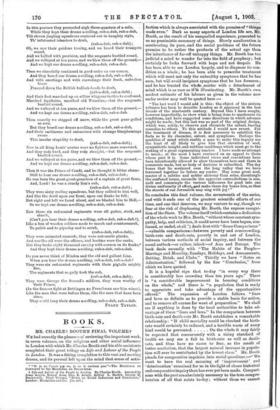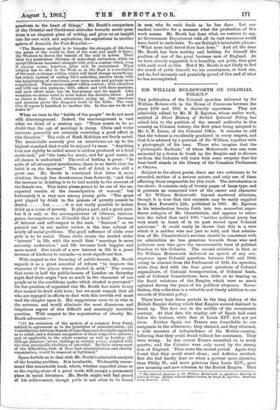BOOKS.
MR. CHARLES BOOTH'S FINAL VOLUME.t
WI' had recently the pleasure of reviewing the important work, in seven volumes, on the religious and other social influences in London with which Mr. Charles Booth and his able assistants completed their great trilogy on Ltfe and Labour of the People in London. It was a fitting completion to this vast and moving drama, and its perusal left upon the mind that sense of satis-
• "St je no l'avais pan vu, je no le croirais pas."—The Msnicust. DE COWEADES E0 the MARECHAL DE BELLE-18LE.
Life and Labour of the People in London. By Charles Booth. Assisted by Jesse Argyle, Ernest Ayes, Geo. E. Arkell, Arthur L. Baxter, George B. Duckworth. Final Volume, "Notes on Social influences and Conclusion." London : Macmillan and Co. [5s. net.]
faction which is always associated with the promise of "things made even." Dark as many aspects of London life are, Mr. Booth, as the result of his unequalled experience, presented to us no pessimistic summary of things. Slowly amelioration is accelerating its pace, and the social problems of the future promise to be rather the products of the actual age than the inheritance of far-off unhappy things. Hr. Booth has too
judicial a mind to wander far into the field of prophecy; but certainly be looks forward with hope and not despair. He has been able to see London largely, and to diagnose its con-
dition as a whole ; he has been able to prescribe treatment which will meet not only the unhealthy symptoms that he has seen, but will avoid incipient symptoms that be has foreseen; and he has 'treated the NVhole„inatter with a detachment of mind which is as rare as iN illuminating. Mr. Booth's own modest estimate of his labours as given in the volume now under review may well be quoted here :—
"The last word I would add is this: the object of the sixtedn volumes has been to describe London as it appeared in the last decade of the nineteenth century. Beyond this I have sought, however imperfectly, to show what is being done to ameliorate its conditions, and have suggested some directions in which advance might be made; but this last was no part of the original design, which was, solely, to observe and chronicle the actual, leaving remedies to others. To this attitude I would now revert. For the treatment of disease, it is first necessary to establish the facts as to its character, extent, and symptoms. Perhaps the qualities of mind which enable a man to make this inquiry are the least of all likely to give him that elevation of soul, sympathetic insight, and sublime confidence which must go to the making of a great regenerating teacher. I have made no attempt to teach ; at the most I have ventured on an appeal to those whose part it is. Some individual views and convictions have been intentionally allowed to show themselves here and there in comments made, but no body of doctrine is submitted. The dry bones that lie scattered over the long valley that we have traversed together lie before my reader. May some great soul, master of a subtler and nobler alchemy than mine, disentangle the confused isstues, reconcile the apparent contradictions in aim, melt and commingle the various influences for good into one divine uniformity of effortAmd make these dry bones live, so that the streets of our Jerusalem may sing with joy!"
So concludes this final volume, the seventeenth of the series, and with it ends one of the greatest scientific efforts of our time, and one that deserves, we may venture to say, though we fear at the risk of displeasing Mr. Booth, the express recogni- tion of the State. The volume itself (which contains a dedication of the whole work to Mrs. Booth, " without whose constant sym- pathy, help, and criticism, it could never have been begun, con- tinued, or ended, at all ") deals first with "Some Comparisons" —valuable comparisons—between poverty and overcrowding. birth-rate and death-rate, poverty in and out of London, between various methods of social inquiry, and between the social outlook—or rather, inlook—of Asia and Europe. The book deals secondly with "The Habits of the People— Marriage and Morality, Sundays, Holidays, and Amusements, Betting, Drink, and Clubs." Thirdly we have "Notes on Administration," followed by the fine "Conclusion," from which we have quoted.
It is a hopeful sign that to-day "in every way there is considerably less crowding than ten years ago," There is "a considerable improvement in housing conditions on the whole," and there is "a population that is ready to appreciate and take advantage of the opportunities offered." . The expansion of London follows "lines and laws so definite as to provide a stable basis for action, and to remove all excuse for want of preparation." We shall see if anything is done by the local authorities to take ad- vantage of these "lines and laws." In the comparison between
birth-rate and death-rate Mr. Booth establishes a remarkable relationship "if child mortality could be checked the birth-
rate would certainly be reduced, and a terrible waste of every kind would be prevented On the whole it may fairly be expected that concurrently with a rising standard of health we may see a, fall in birth-rate as well as death- rate, and thus have no cause to fear, as the result of better sanitation, that the largest natural increase in popula- tion will ever be contributed by the lowest class." Mr. Booth pleads for comparative inquiries into social questions :—" We want to have the real meaning of 'improvement' and ' deterioration ' examined for us in the light of closer historical and comparative inquiry than has ever yet been made. Compari- sons with the past aresbsolutely necessary to the true compre- hension of all that exists to-day ; without them we cannot penetrate to the heart of things." Mr. Booth's comparison of the Oriental and Occidental attitudes towards social ques- tions is an eloquent piece of writing, and gives us an insight into his own work and aspirations, the aspirations in another sphere of Arnauld, the Port-Royalist :--
"The Eastern method is to transfer the struggle of life from the arena of the world to that of the soul, and quell it there ; the Western to drown the tumult of the soul in action. Their ideal is a passionless Nirvana of individual extinction, while we accept life as an incessant struggle with evil, a combat which, even if success seems hopeless, must still be maintained. What religion has to offer in the West as in the East is a revolution of the soul; a change within, which will itself change everyth:ng; but which, instead of ending life's activities, renders them, with the heightening of conscience, even more acute and pethaps more complicated. There arises contest within contest ; with ourselves and with our own passions; with others and with their passions, and each effort made has its fore-runner and its sequel. Like wrestlers we strive wrist to wrist before the decisive throw. 41ad no throw is final. Fresh adversaries spring up. Our emotions and passions prove the dragon's teeth of the fable. The very id e:a of repose is banished to another life. In this one we do not &site it"
When we turn to the "habits of the people" we do not meet with discouragement. Indeed, the encouragement is vast When we think of a century ago. "There seems to be na d5ubt that the age of marriage is rising. Clubs and wider
interests -generally are certainly exercising a good effect in this direction." The evils of Bank Holidays are freely noted. The music-halls scarcely give an entertainment up to the highest standard that would be enjoyed t y most. "Anything tat can rightly be called music is seldom produced at a local music-hall," yet "the taste for music, and for good music, in all classes is undoubted." The evil of betting is great : "In spite of all attempted interference, there is no doubt that the habit is on the increase." The evil of drink is also still a great one. Mr. Booth is convinced that there is more drinking thcugh less drunkenness than formerly, "and that the increase in drinking is to be laid mainly to the account of the female sex. This latter phase:seems to be one of the un- expected results of the emancipation of women," but fortunately it is very rare among young girls. "The great pert played by drink in the genesis of poverty cannot be
denied but it is not really possible to isolate drink as a cause of poverty. It plays a part, and a great part, but it is only as the accompaniment of idleness, extrava- gance, incompetence, or ill-health that it is fatal." Increase
of' interest and self-respect is the cure. "Interest," as we pointed out in our earlier review, is the true solvent of nearly all social problems. The good influence of clubs over
girls is to be noted. These clubs create the needed wider " interest " in life, with the result that "marriage is more seriously undertaken" and life becomes both happier and more moral. One result of a new interest in life is a great increase of kindness to animals,—a most significant fact.
With respect to the licensing of public-houses, Mr. Booth regards it as a great essential of reform "to improve the
character of the places where alcohol is sold." The scenes that occur in half the public-houses of London on Saturday
night find their origin "not so much in the character of our people aa in the conditions under which• alcohol is purveyed." On the question of organised vice Mr. Booth has much to say that cannot be dealt with here; but we must remark that all who are engaged in efforts to deal with this terrible evil must read the chapter upon it. His suggestions seem to us wise in the extreme, and would eliminate the most disastrous and iniquitous aspect of this difficult and seemingly insoluble question. With respect to the organisation of charity Mr.
Booth advocates :—
"(1) An extension of the system of a common Poor Fund, subject to agreement as to the principles of administration; (2) Consultations between Boards of Guardians and charitable agencies as to relief, and a distinct recognition of their respective spheres ; and, as applicable to the whole country as well as London, (3) Old-age pensions [seven shillings at seventy yearsj, coupled with the then practicable abolition of out-relief. By these means most of the difficultiosi both of Poor Law administration and. charity organisation, would be removed or lightened."
Space forbids us to deal with Mr. Booth's admirable analysis of the housing problem. It is invaluable. We heartily recom-
mend this remarkable book, which, whether regarded alone or as the coping-stone of a great work, will occupy a permanent place in social literature. Mr. Booth might well feel, proud of his achievement, though pride is not often to be found in men who do such deeds as he has done. Let our readers consider for a moment what the production of this work means Mr. Booth has done what, we venture to say, no Government Department with all its vast resources would have dared to undertake. To use Raleigh's inimitable phrase : "What none hath dared thou haat done." And all the time Mr. Booth has been making and holding for himself the position of one of the great business men of England. As we have already suggested, it is humility, not pride, that goes with such work as this. But if Mr. Booth is not likely to feel the touch of pride himself, we, his countrymen, at least can, and do, feel intensely and gratefully proud of him and of what he has accomplished.







































 Previous page
Previous page